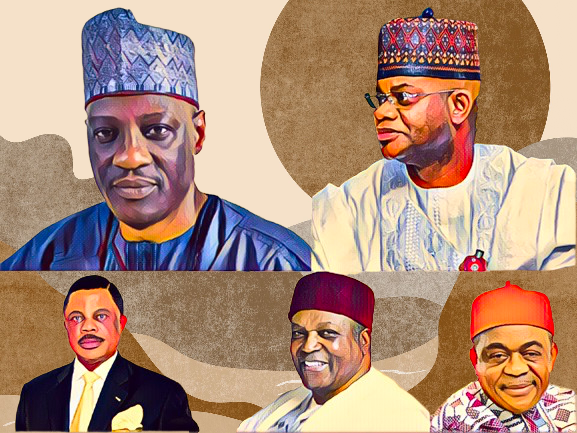Key Points
- EFCC ex-governors corruption trials reflect systemic justice delays.
- Legal hurdles and judge changes stall EFCC’s prosecution efforts.
- Public interest in EFCC corruption cases continues to fade.
Since 2024, Nigeria’s Economic and Financial Crimes Commission (EFCC) has charged five former governors with corruption, adding to a list of 35 ex-governors prosecuted since 2004.
These trials, involving public fund diversion, money laundering, and breach of trust, highlight systemic challenges in Nigeria’s anti-graft efforts.
Former Governors Abdulfatah Ahmed (Kwara), Willie Obiano (Anambra), Yahaya Bello (Kogi), Darius Ishaku (Taraba), and Theodore Orji (Abia) are the latest to face the EFCC.
Each pleaded not guilty to the charges, but the trials have been mired in judge transfers, motions challenging jurisdiction, and prolonged legal delays.
Ahmed, accused of misappropriating N5.78 billion in UBEC funds, was re-arraigned due to a judge reassignment. Prosecution has called six witnesses detailing project abandonment and misused funds.
In Obiano’s case, the EFCC alleged he diverted N4 billion through unauthorized companies and named his wife as a beneficiary. Ten witnesses have testified, but the suspension of the trial judge may force the trial to restart.
Public interest wanes as cases face lengthy courtroom battles
The EFCC ex-governors corruption trials are increasingly losing public interest. The sheer complexity and delays involved in prosecuting politically exposed persons contribute to skepticism about accountability. Yahaya Bello’s saga, in particular, exemplifies the hurdles.
After months of evading arrest, Bello was declared wanted and later surrendered. He now faces N110 billion corruption charges alongside two co-defendants.
The EFCC also alleges he used public funds to buy properties and pay $720,000 in school fees for his children abroad.
Yet, with repeated absences from court and conflicting court orders, the case has become a legal quagmire. Despite testimony from real estate firms and bank officials, the case remains far from resolution.
Courtroom drama overshadows anti-corruption mission
Beyond the legal arguments, the EFCC trials of ex-governors have become theatre-like spectacles.
From Obiano’s dramatic airport arrest to Bello’s convoy escape amid gunfire, the cases reflect more than just justice delays—they show deep institutional weaknesses.
In many instances, EFCC faces resistance from state machinery or legal maneuvers that test its authority.
Witness testimonies, including those from civil servants, contractors, and bank officials, underscore the scale of alleged misuse of public resources. However, convictions remain elusive.
These cases offer a glimpse into the Nigerian justice system’s struggle with accountability for powerful individuals.
Unless systemic reforms follow, the EFCC’s high-profile prosecutions risk becoming cautionary tales rather than deterrents.


